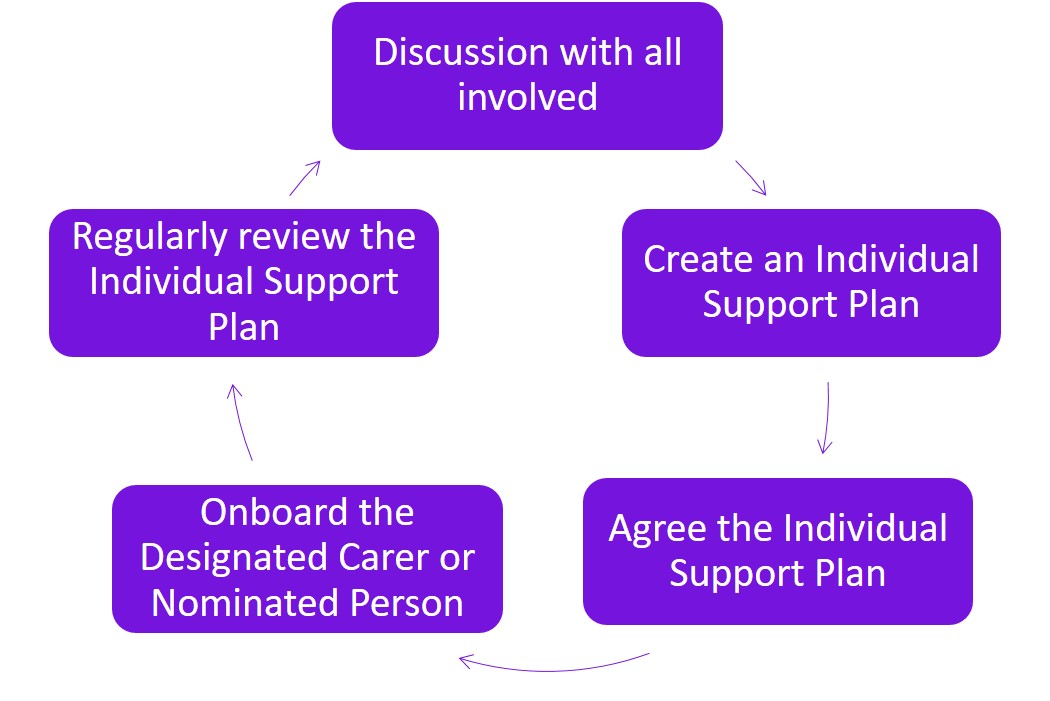Providing Intimate & Personal Care
Guidance for County/Area/Region (Scotland) Commissioners involved in the provision of personal and intimate care
Quick links

This policy is about living our values and our commitment to delivering Scouts for everyone. It outlines how we facilitate care, ensuring that the movement is open and accessible, and that people are treated with dignity and respect. By supporting young people who require personal or intimate care, we can ensure that even more young people can enjoy the adventure of Scouts, and that Scouts will be as diverse as the communities in which we live.
Tom Milson, UK Lead Volunteer for Inclusion
This policy is currently being trialled in a number of counties. If you would like your county to participate, please email us on inclusion@scouts.org.uk.
When the policy should be used
We should apply the Intimate & Personal Care Policy when any young person or adult requires care, which is described as ‘personal’ or ‘intimate’ to enable them to take a full and active part in Scouts.
Support might be temporary, such as during an illness or after an accident (for example a young person who has a broken leg), or support might be long-term (for example a developmental disability, such as Cerebral Palsy).
This policy is not for emergency toileting situations that most groups encounter. When this occurs, leaders should always deal with the young person in pairs and in a respectful manner as detailed within the Yellow Card.
Personal care
The physical care that supports the personal hygiene, toileting or any medical care of an individual. This is non-invasive and does not involve touching intimate areas of the body
Intimate care
This type of care is usually associated with toileting, personal hygiene with direct contact or exposure to the intimate areas of the body.
Who provides the care
Adults supporting young people with their personal and intimate care will be assigned one of two volunteer roles.
Chapter 8 of the policy sets out in detail the intimate care and personal care, which these roles may facilitate.
If there's any uncertainty about the availability, training or suitability of a Nominated Person or the Designated Carer, please contact the Support Centre for advice from the National Inclusion Team.
Designated Carer
A person who, outside Scouts, provides the care for the individual person. This will most commonly be the young person’s parent or carer, legal guardian or a care professional.
Nominated Person
An existing volunteer who, due to their professional training or experience outside Scouts, has received appropriate training to complete intimate and personal care for young people.
Who plans the care
It is important that the right people are included when planning and reviewing a young persons care and the following people are key to the discussions:
Alongside their parents and carers, it's essential that the young person is actively involved in the planning and provision of their care. Wherever possible they should be offered the choice of the Nominated Person or Designated Carer.
We recognise that the parents and carers of our young people are the experts in the provision of their care. Parents and carers should be active participants in planning the care. They will have developed effective strategies to support the young person on a daily basis and will offer invaluable guidance. In many circumstances the parents and carers will step into the role of Designated Carer.
Depending on the age and the complexity of needs of the individual, advice from relevant professionals, such as their GP, Paediatrician, Occupational Therapist, Teacher, Teaching Assistant, Social Worker, Psychologist or appropriate external organisations maybe required. Parents and carers should be offered the opportunity to involve professionals to inform the Individual Support Plan.
- The role of the Section Leader is to meet with the young person, their parents, carers, Designated Carer or Nominated Person, and relevant professionals to discuss what care is required and to create the Individual Support Plan. The Section Leader may be supported by the District or County team if required.
- The County/Area/Region (Scotland) Commissioner is responsible for making sure that the policy is followed and implemented correctly. They also need to agree and sign the Individual Support Plan. They can delegate this role to someone in their team. The delegated representative might be the Assistant County/Area/Region (Scotland) Commissioner for Inclusion or the Assistant District Commissioner (Inclusion). They should have a full and complete understanding of the policy and have professional or voluntary experience of working with young people with additional needs.
- The Group Scout Leader and District Explorer Scout Commissioner can help ensure continuity of support as the young person moves through the Sections and provide guidance around what reasonable adjustments can be made. They, along with the District Commissioner, should be made aware of the plan.
The steps to follow
- Discussion with all involved: In the first instance, the Section Leader should meet with the young person and their parents and carers to establish what reasonable adjustments and care provisions are required.
- Create an Individual Support Plan: These care provisions are documented in an Individual Support Plan.
- Agree the Individual Support Plan: This plan must be agreed and signed by all people involved.
- Onboard the Designated Carer or Nominated Person: Those providing the care are appointed (if applicable) and be provided with the necessary training. See chapters 4 & 9 for full details.
- Regularly review the Individual Support Plan: Reviewing the plan on a termly basis is good practice, however you should consider the level and complexity of care needed when agreeing the frequency. You should always review the plan if there is a change of needs, environment or individuals supporting the plan.

Appointing the Designated Carer or Nominated Person
- The Designated Carer will be subject to the usual Appointment Process as outlined in POR chapter 16 and verified by the County/Area/Region (Scotland) Commissioner or their delegated representative. They should be added to Compass and assigned the Occasional Helper/Designated Carer role.
- Whilst the Nominated Person will already be a volunteer and will therefore have been through the Appointments Process, the County/Area/Region (Scotland) Commissioner or their delegated representative will need to verify that the person has received the appropriate training to carry out intimate or personal care.
Completing the Individual Support Plan
The Individual Support Plan is an important tool in planning the provision of intimate and personal care. It formally documents what has been agreed between the young person, their parents and carers, the Section Leader and Designated Carer or Nominated Person.
The plan should be stored in line with the UK Data Protection Act (2018) and the Scouts data protection policy.
Where appropriate, the plan should be available to the relevant people involved, for example to the young person, their parents and carers, the Group Scout Leader or the District Commissioner.
Personal and Intimate Care for over 18's
The same principles and steps apply for providing personal and intimate care for over 18's. However, there are a few minor changes in process to be aware of:
- Only a Designated Carer can provide personal and intimate care for a person over the age of 18. A Nominated Person cannot take on the care provision in this circumstance.
- As with young people, the Appointment Process, detailed in POR chapter 16 applies to the Designated Carer.
- The form is slightly different for someone over 18. The form is called Adult Personal Care Plan and should be completed with their volunteer line manager and any other people that support them. The County/Area/Region (Scotland) Commissioner doesn't need to sign off the Adult Personal Care Plan.
- If the volunteer has a role within a Group or an Explorer Unit, then the Group Scout Leader or the District Explorer Scout Commissioner should be aware that an Adult Personal Care Plan is in place.